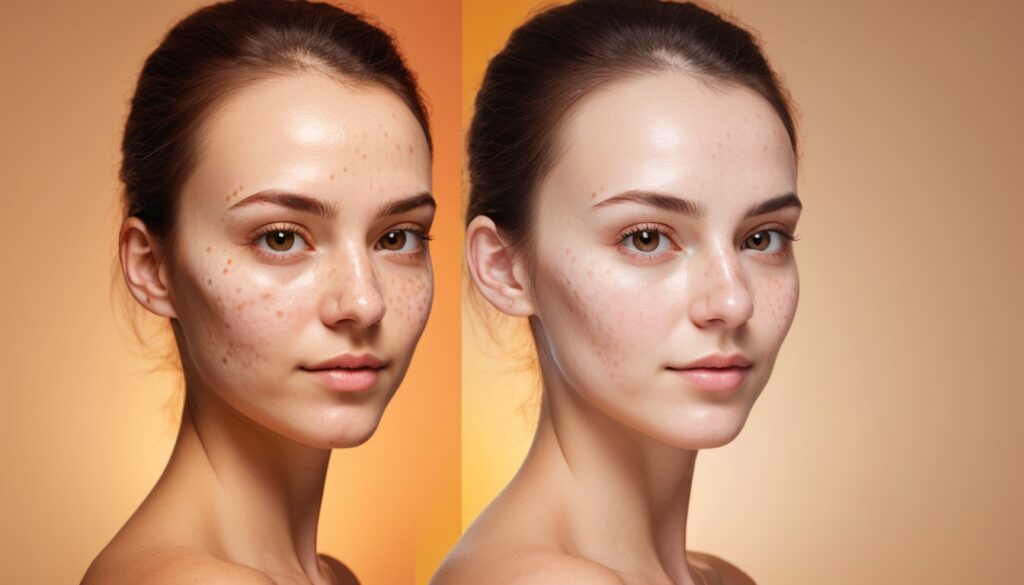For acne-prone skin, DIY skincare mishaps are the worst, especially when they leave you with unwanted souvenirs like dark spots. Mine involved a questionable lemon juice situation too, let me tell you! Big fail.
Anyway, on a brighter note (pun intended!), that whole experience made me hyper-aware of those pesky dark spots. They seriously know how to photobomb a good selfie, right? So I went on a quest to find a safe and effective way to banish them. Turns out, vitamin C serum is like the holy grail solution in that department!
Before I spill the tea on how to use vitamin C serum (because that’s the real magic trick here!), let’s chat a little bit about what vitamin C is and why it’s the dark spot kryptonite we’ve all been waiting for.
In This Article
What is Vitamin C?
Vitamin C, also known as ascorbic acid, isn’t just for boosting your immunity during the cold season. It’s a powerful antioxidant that shows up in nature’s bounty, like citrus fruits (think: oranges) and berries, and it can also be produced synthetically for skincare products. These antioxidants act like tiny shields for your skin, protecting it from collagen breakdown and neutralizing damage caused by free radicals1.
Free radicals? They’re unstable molecules that roam around your skin thanks to everyday aggressors like air pollution, sunlight (especially those UV rays), and even harsh weather. These free radicals can damage your skin and contribute to signs of ageing – think wrinkles, fine lines, and yes, even pesky dark spots.
That’s where vitamin C comes in! Because of its antioxidant properties, it helps decrease skin breakdown and discolouration. So basically, vitamin C helps fight off those free radical bullies and keeps your skin looking bright and even.
Vitamin C Serum Benefits for Banishing Dark Spots

Okay before we dive into how to use the vitamin C serum for dark spot reduction, let’s get down to the nitty-gritty of why vitamin C serum is the ultimate sidekick for our fight against dark spots! We already talked about how it acts like a protective shield against free radicals, but there’s so much more this magic ingredient can do!
Here’s why this serum is your secret weapon for an even, radiant complexion:
- Safe for Most Skin Types: Unlike my ill-fated lemon juice experiment, vitamin C serum is generally gentle enough for most skin types, even sensitive ones (although always patch test first!). No more worrying about irritation or redness.
- Moisture Magnet: Vitamin C serums are often formulated with hyaluronic acid or other hydrating ingredients. This means they fight dark spots and keep your skin plump and dewy – a win-win!
- Brightening Booster: By inhibiting melanin production (the pigment responsible for dark spots), vitamin C helps lighten existing spots and prevent new ones from forming.
- Redness Reduction: Vitamin C has anti-inflammatory properties that can help soothe redness and irritation. So say goodbye to blotchy skin and hello to a calm, cool complexion.
- Hyperpigmentation Houdini: Whether it’s from sun damage, acne scars, or other factors, hyperpigmentation can be a drag. Vitamin C helps fade those stubborn dark spots and even out your skin tone for a more flawless appearance.
Wait, there’s more! Vitamin C serum isn’t a one-trick pony. Here are some other amazing benefits to consider:
- Under-eye Circle Eraser (almost!): While it might not completely banish those late-night study session shadows, vitamin C can help brighten the under-eye area and reduce the appearance of dark circles.
- Collagen Creation Champion: Vitamin C plays a role in collagen production, which is essential for maintaining skin firmness and elasticity. Think of it as a natural anti-ageing booster!
- Sagging Skin Savior (potential): By promoting collagen production, vitamin C may help prevent sagging skin and keep your face looking youthful and lifted2.
- Sun Damage Shield: Vitamin C offers some protection against sun damage, but it’s definitely not a replacement for sunscreen! Always wear SPF, but vitamin C can be an extra layer of defence.
- Sunburn Soother: Vitamin C has anti-inflammatory properties that can help soothe the discomfort of sunburns. Think of it as a post-sun exposure treat for your skin (but again, sunscreen is always the best prevention!).
- Wound Healing Warrior (potential): Some studies suggest vitamin C may promote wound healing, which could be helpful for minor cuts or scrapes.
- Improved Skin Texture: Vitamin C can help smooth out rough skin texture and minimize the appearance of pores. Hello, smoother, more refined complexion!
- Enhanced Skin Barrier Function: Vitamin C may help strengthen your skin’s natural barrier, which helps it better defend itself against environmental stressors.
Vitamin C serum is generally gentle enough for most skin types. With that sorted, let’s dive into the basics of how to use vitamin C serum next!
How To Use Vitamin C Serum for Dark Spots

Selecting the Best Vitamin C Serum for You
First things first, you gotta pick the right vitamin C serum for your skin type and concerns. There are different formulations out there, so here’s a quick breakdown:
- The Classic: Liquid Serums: These are lightweight and absorb quickly, making them a great choice for most skin types (except maybe super oily skin).
- Hyaluronic Acid +: Some serums combine vitamin C with hyaluronic acid, which adds a boost of hydration – perfect for dry or dehydrated skin.
- Sensitive Skin Savior: For those with easily irritated skin, there are gentler vitamin C serums formulated with soothing ingredients.
Remember, a little goes a long way! Most serums only require a few drops to cover your entire face.
The Power of Consistency: Establishing a Routine
Now, here’s the key to unlocking the full potential of your vitamin C serum: consistency is queen! Aim to apply your serum twice a day, once in the morning and once at night. This will ensure your skin gets a constant dose of vitamin C goodness to fight off those dark spots.
Tip: Since vitamin C can break down in sunlight, applying it in the morning followed by sunscreen is a great one-two punch against dark spots and sun damage.
Power Partners
Beyond the basics, vitamin C can be a great teammate for other powerhouse ingredients:
- Antioxidants: Vitamin E and Ferulic Acid work together with vitamin C to boost its antioxidant power and protect your skin from free radical damage.
- Hyaluronic Acid: This hydrator helps keep your skin plump and supple, minimizing the appearance of wrinkles and fine lines, while also allowing vitamin C to penetrate deeper.
- Niacinamide: This form of vitamin B3 can improve skin barrier function, reduce redness and inflammation, and minimize pores, complementing the brightening effects of vitamin C.
Remember, when choosing products, it’s important to look for ones that contain a stable form of vitamin C and are formulated with ingredients that complement its benefits.
Pairing Your Serum with Other Products
Vitamin C serum plays well with others! Here are some products you can team it up with to maximize its dark-spot-fighting power:
- Gentle Cleanser: Start with a clean canvas! Using a gentle cleanser will remove any dirt or oil that could block the absorption of your vitamin C serum.
- Hydrating Moisturizer: Vitamin C serums can sometimes be slightly drying, so following up with a good moisturizer with vitamin E will keep your skin hydrated.
- Sunscreen (always!): This one’s a no-brainer. Sunscreen is essential for preventing new dark spots from forming, and it can also help your vitamin C serum work more effectively.
Strategic Timing: When to Apply
Here’s a quick tip on when to apply your vitamin C serum for maximum impact:
- Mornings are Best: Since vitamin C offers some protection against sun damage, applying it in the morning followed by sunscreen is a great way to shield your skin throughout the day.
Nighttime Application (Optional): While morning application is ideal, you can also use your vitamin C serum at night. This allows it to work its magic while you sleep and can be especially beneficial if you’re concerned about irritation.
Choosing Your Vitamin C Serum Strength: A Spice Guide

Not all vitamin C serums are created equal, especially when it comes to concentration. Think of it like choosing your spice level at a restaurant: you wouldn’t order the fiery habanero salsa if you have a super sensitive palate, right? The same goes for vitamin C! So, let’s figure out which concentration (usually ranging from 10% to 30%) is the perfect match for your unique skin type.
Here’s a quick breakdown to help you navigate the spice level:
- Sensitive Skin? Start Low (10-15%): If your skin is easily irritated, a gentler formula with a lower concentration (around 10-15%) is your best bet. You can always gradually increase the strength later on if your skin tolerates it well.
- Normal Skin? You’ve Got Options (15-20%): Lucky ducks with normal skin have more flexibility! A concentration between 15-20% is a good starting point. You can adjust based on your desired results and how your skin reacts.
- Oily or Acne-Prone Skin? Go Potent (20%+) For oily or acne-prone skin, a higher concentration (20% or more) might be more effective. Just be extra mindful of potential irritation and patch test religiously!
Tip: It’s always better to start with a lower concentration and increase gradually as your skin adjusts. Listen to your skin – if it feels itchy, red, or overly tingly, dial it back!
Finding Your Perfect Vitamin C Match: Beyond Concentration
Here are some additional factors to consider when choosing your vitamin C serum:
- Formulation: Some serums combine vitamin C with other beneficial ingredients like hyaluronic acid (for hydration) or niacinamide (for redness reduction). Pick a formula that targets your specific concerns.
- Packaging: Vitamin C is sensitive to light and air, so look for a serum that comes in an opaque bottle with a dropper to minimize exposure.
- Reviews: Don’t be afraid to do some research and read reviews from people with similar skin types to get their insights on different vitamin C serums.
Keep in mind that consistency is key when it comes to seeing results with how to use vitamin C serum. So, be patient, find the right product for you, and get ready to say goodbye to those pesky dark spots.
How Often Should You Apply Vitamin C Serum?
Okay, how often should you REALLY be using vitamin C serum to see those dark spots vanish? Before I break it down, let’s address the impatience monster living inside all of us (because, let’s be real, who wants to wait forever for results?).
Patience is a Virtue: The Timeline for Fading Dark Spots
Here’s the thing about vitamin C serum – it’s not a magic eraser that zaps away dark spots overnight. Think of it as a marathon runner, not a sprinter. While some people might see a slight improvement within a few weeks, it typically takes consistent use for 2-3 months to see more dramatic results. I know, waiting isn’t fun, but trust the process! Your skin needs time to adjust and reap the full benefits of the vitamin C goodness.
Here’s a quick timeline to manage your expectations:
- Weeks 1-2: You might not see a huge difference yet, but your skin might feel smoother and more hydrated (thanks to those hydrating serums!).
- Months 2-3: This is where the magic starts to happen! Dark spots might appear lighter, and your overall skin tone could look more even.
- Months 3+: With continued use, you can expect even more significant fading of dark spots and a brighter, more radiant complexion. Basically, the long-term glow-up is real!
Tip: Consistency is key! Sticking to a regular routine of how to use vitamin C serum is crucial for seeing those results. Don’t give up after a few weeks – keep at it and your skin will thank you!
Don’t Let Your Serum Lose Its Superpowers: Storage Essentials

Vitamin C is like a superhero with a weakness: it’s not a huge fan of light, air, or heat. These elements can break down the vitamin C, rendering it less effective. So, how do we keep our little superhero happy and potent? Here are some storage tips:
- Darkness is Your Friend: Store your vitamin C serum in a cool, dark place. Think cabinets, drawers, or even a cute little skincare box – anywhere away from direct sunlight. Your bathroom shelf might seem convenient, but all that steam from hot showers can be a no-no.
- Keep it Sealed Tight: After you use your serum, make sure to screw the cap on nice and tight. This helps minimize air exposure and keeps your serum fresh for longer.
- Fridge Favored (Optional): While not essential for all serums, some people like to store their vitamin C serum in the fridge. The cool temperature can help preserve its potency for even longer. Just be sure the fridge isn’t too cold, and avoid letting the serum freeze.
Know When to Say Goodbye: Expired Serums
Here’s the thing – even with the best storage practices, all good things must come to an end. Vitamin C serums do have a shelf life, and once they expire, it’s time to say goodbye. Using an expired serum won’t harm your skin, but it likely won’t be as effective in tackling those dark spots. Most serums will have an expiration date printed on the bottle, so keep an eye out for that.
By following these simple storage tips, you can ensure your vitamin C serum stays potent and effective for as long as possible. Remember, a happy serum is a dark-spot-fighting serum! So store your serum with care, as it’s another crucial step in learning the art of how to use vitamin C serum.
Safety Considerations When Using Vitamin C Serum
Before you go on a serum shopping spree and drench your face in vitamin C goodness, let’s chat about safety for a sec. Generally, vitamin C serum is well-tolerated by most skin types, but there are a few things to keep in mind to avoid any potential irritation. After all, we want happy, glowing skin, not a red, itchy mess, right? So, let’s navigate how to use vitamin C serum safely and effectively!
Safety First: Potential Side Effects
Vitamin C serum is a powerful ingredient, but it can have a little off-day sometimes. Here are some potential side effects to be aware of:
- Irritation: This is the most common side effect, especially for people with sensitive skin. It might manifest as redness, stinging, or a tingling sensation. If you experience any of these, dial back the frequency of use or try a gentler formula.
- Dryness: Some vitamin C serums, especially those with high concentrations, can be slightly drying. Make sure to follow up with a good moisturizer to keep your skin happy and hydrated.
- Increased Sun Sensitivity: Vitamin C can make your skin more sensitive to the sun. This is why applying it in the morning followed by sunscreen is a double whammy against dark spots and sun damage. SPF is always your BFF, no matter what!
Consulting a Dermatologist: When in Doubt, Get Checked Out
If you have any concerns about using vitamin C serum, especially if you have a pre-existing skin condition, it’s always best to consult a dermatologist. They can assess your individual needs and recommend the best course of action for your unique skin.
Here are some situations where consulting a dermatologist might be a good idea:
- Sensitive Skin: If you have very sensitive skin, a dermatologist can help you choose a gentle vitamin C serum formula and advise on how to introduce it into your routine safely.
- Pre-existing Skin Conditions: If you have conditions like rosacea or eczema, a dermatologist can advise you on whether vitamin C serum is right for you and how to use it safely.
- Concerns about Concentration: Feeling overwhelmed by all the different vitamin C serum concentrations out there? A dermatologist can help you determine the right strength for your skin type and goals.
Final Thoughts
Achieving even skin tone with vitamin C serums requires patience and a consistent routine. While serums come in various strengths, those with sensitive skin should begin with a lower concentration (10-15%) and gradually increase as tolerated. Apply twice daily, ideally in the morning followed by sunscreen, and again at night. Remember, significant results can take 2-3 months, so trust the process and prioritize consistent use. To maximize effectiveness, store your serum in a cool, dark place. Finally, always patch test before full application and consult a dermatologist for personalized advice, especially if you have sensitive skin or pre-existing conditions.






Leave a Reply